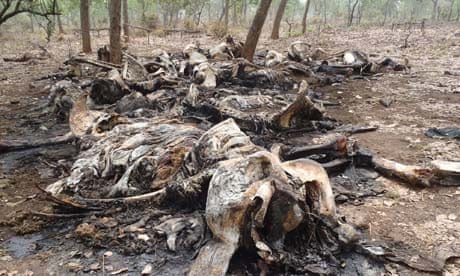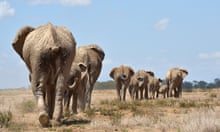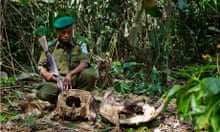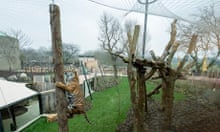Poachers in south-west Chad have killed at least 86 elephants including 33 pregnant females in less than a week, in a potentially devastating blow to one of central Africa's last remaining elephant populations.
Groups of elephants follow traditional migration routes during the dry season from Central African Republic, through Chad to Cameroon. Thirty years ago there were estimates of 150,000 animals across the region, but today that figure could be as low as 2,000.
According to the International Fund for Animal Welfare (IFAW), the elephants were killed near Fianga, close to the border between Chad and Cameroon, and their tusks were hacked off. Fianga is near a cross-border national park area – Sene Oura in Chad and Bouba N'Djida in Cameroon, where many elephants spend the dry season before the rains start in April. It is thought the animals were killed by Chadian and Sudanese poachers travelling on horseback carrying AK47s and hacksaws to remove the tusks.
"The poachers killed pregnant females and all the calves," said Celine Sissler-Bienvenu from IFAW. "Even if the conditions were right, which they are not, it would take more than 20 years for this population to recover".
The Chad-based NGO SOS Elephants reported late last year that hundreds of elephants had moved into Chad in an attempt to escape poaching in Bouba N'Djida park, where 650 elephants were killed in a matter of days in February 2012.
The Central African region has seen years of conflict and poor governance, and anti-poaching efforts announced by the Chadian president, Idriss Déby Itno, including signing an agreement with IFAW to provide guards in Sene Oura, show few results.
Anti-poaching teams are often poorly equipped and the guards themselves are targeted. Ten were killed trying to protect elephants between 2006-09 in Zakouma national park, in south-east Chad. As the Darfur conflict raged along the Chad/Sudan border, horseback raiders crossed into Zakouma, killing around 3,000 elephants in three years. At one point an average of three elephants a day were being slaughtered.
The poaching gangs are targeting the elephants for their valuable ivory which is thought to be smuggled out to Chinese markets through Sudanese and Nigerian ports. Local newspapers in Chad have reported cases of Chinese nationals being caught carrying ivory at N'Djamena airport, though no prosecutions were opened.










